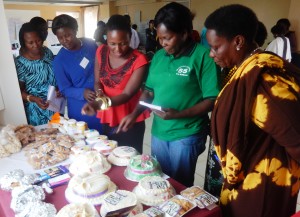Mastercard rates Ugandan women highly

The average entrepreneur in Uganda is a female between 18-34 years old with at least secondary education and working in the customer service sector.
March 13–Ugandan women have been rated highly for their positive attitude to business despite a generally not supportive institutional environment, apart from the interventions of such entities as the Uganda Women Entrepreneurs Association Limited (UWEAL) and Enterprise Uganda.
The Mastercard Index of Women Entrepreneurs 2017 examined 54 different economies around the globe, including Botswana, Ethiopia, South Africa and Uganda.
Uganda scored particularly well in terms of advancement outcomes: the women entrepreneurial activity rate was 100%, with its labour force participation rate at 93.9%, making the country top in these areas worldwide.
Uganda also excelled in sharing knowledge assets with women and providing financial access, with 90.5% borrowing or saving to open a business – higher than the 52.4% average of other low to lower middle income countries – and a 95.8% gross women tertiary education enrollment rate.
The index shows that Ugandan women are as likely as men to start a business activity and have started one for a maximum of three and a half years. However the report points out that there are also gender-related challenges that hinder Ugandan women from prospering in business, such as family responsibilities (taking care of children and elderly) and taking on reproductive roles.
In addition, women entrepreneurs at the micro level are especially disadvantaged due to the lack of access to financial services and funding – most have no credit history and are unable to obtain bank loans for business startups.
“The result of this survey collaborates an economic reality in Africa that women continue to overcome formidable challenges to remain a cornerstone of trade and productivity on the continent,” Daniel Monehin, the Division President for Sub-Saharan Africa and head of Financial Inclusion for International Markets at Mastercard said.
The index tracks female entrepreneurs’ ability to capitalize on opportunities granted through various supporting conditions within their local environments and is the weighted sum of three components: 1) Women’s Advancement Outcomes (degree of bias against women as workforce participants, political and business leaders, as well as the financial strength and entrepreneurial inclination of women), 2) Knowledge Assets and Financial Assets (degree of access women have to basic financial services, advanced knowledge assets, and support for small and medium enterprises), and 3) Supporting Entrepreneurial Conditions (overall perceptions on the ease on conducting business locally, quality of local governance, women’s perception of safety levels and cultural perception of women’s household financial influence).
The report recognized Uganda’s own internal market dynamics as the key enablers supporting entrepreneurial activities. But also pointed out that ‘Although the underlying support system for SMEs in the country is very poor and among the weakest globally (49.3, rank 52), the setup of various associations such as Enterprise Uganda and UWEAL have been crucial in extending vital support and resources to entrepreneurs (including the youth) through training, business advisory services, financial literacy guidance, leadership training, and credit facilitation services’.
UWEAL is also focused on advocating favorable policies that help women entrepreneurs to flourish and sets up programs to support women doing business within the East African region.
Mastercard is a US-based financial services and technology company. Drawing on findings from the Global Entrepreneurship Monitor (GEM), World Bank, World Economic Forum (WEF), Economist Intelligence Unit (EIU), International Labor Organization (ILO), Mastercard in-house research and numerous other studies and research papers, the Index shows that there are some economies with exceptionally unique internal market dynamics and localized conditions that are natural drivers of women entrepreneurship.

 African Heads of state head to South Korea next week for Summit talks
African Heads of state head to South Korea next week for Summit talks
 Trading leads as main source of income for Ugandans
Trading leads as main source of income for Ugandans
 New leadership for bankers’ umbrella as total assets top $12 billion
New leadership for bankers’ umbrella as total assets top $12 billion
 Brussels Airlines to announce Nairobi service
Brussels Airlines to announce Nairobi service
 SITA promises enhanced travel experience after Materna acquisition
SITA promises enhanced travel experience after Materna acquisition
 Saudia’s 105 aircraft order stretches A320neo lead over rival Max
Saudia’s 105 aircraft order stretches A320neo lead over rival Max
